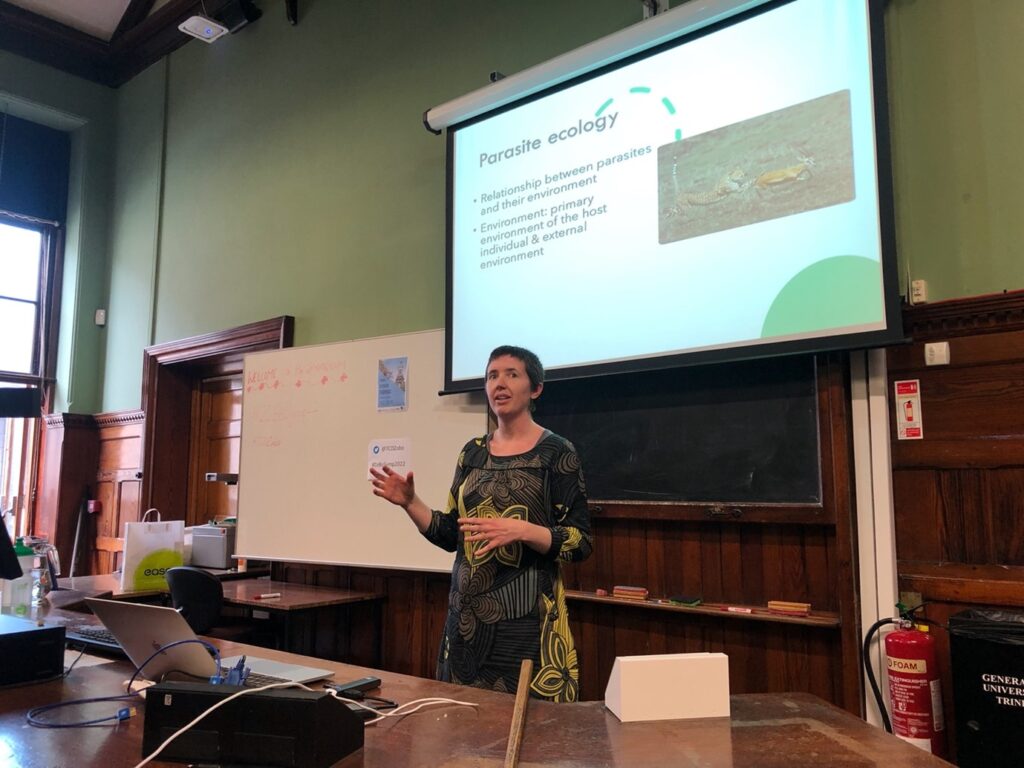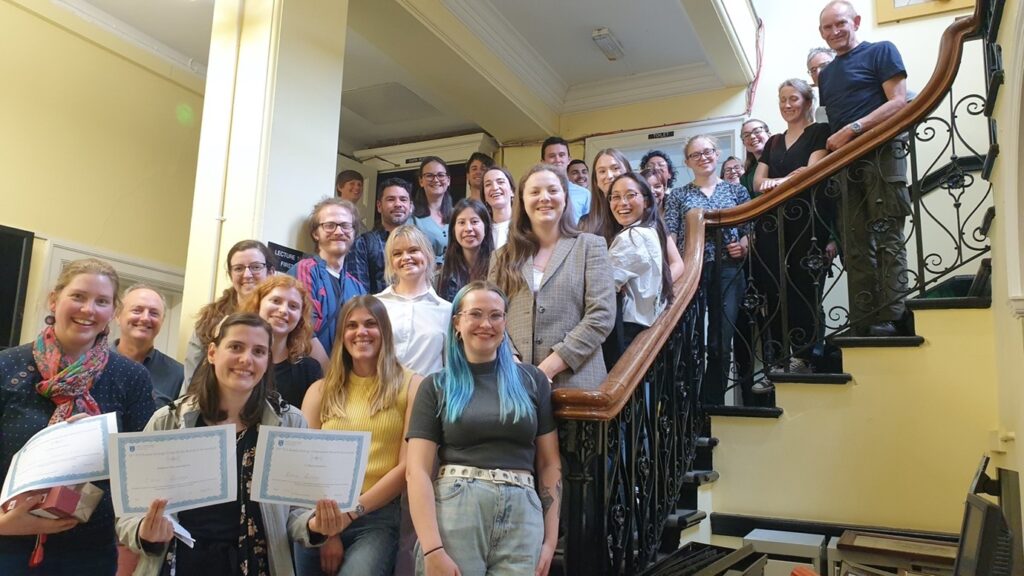After a hiatus during which the Symposium had to move online, the annual TCD Botany-Zoology Postgrad Symposium finally made it’s return to an in-person format at the start of June 2022 for its 11th edition. It was a great opportunity to for the departments of Botany and Zoology to come together and hear about the wonderful research that is being carried out around the School of Natural Sciences. For some of us, it was our first time meeting certain people in person after many Zoom calls. The range of research that was showcased spanned from sharks to social media, and detoured through seaweed and the ever present climate change. We were delighted to welcome two guest speakers, Dr Anthony Heijenga from GIA Consultancy and Dr Katie O’Dwyer from the newly rechristened Atlantic Technological University, who brought in their unique perspectives on research.

The Symposium kicked off with the first of our plenary speakers, Dr Anthony Heijenga, who gave us a fascinating insight into what you can do with a biology degree. Between growing plants in space, flying in zero gravity and watching exploding rockets, there was plenty to keep the audience entertained. Anthony also gave us an overview of his work on plants and the challenges of growing plants in space.

After our first plenary speaker, it was on to our student presentations. First in the session was Haley Dolton, a third year PhD student in Dr Nick Payne’s lab, who presented her research on investigating the anatomy and physiology of basking sharks to understand why they behave the way they do.
Following Haley was Romane Guernalec, a masters student and intern in the Botany Department, supervised by Dr Matt Saunders. Romane works on methane fluxes from aerenchymous species (specifically Typha latifolia) in restored peatlands, and presented her plans for her fieldwork in Ireland.
Next up was Marine Valmier, a fourth year PhD student supervised by Dr Matt Saunders, who is looking at the impacts of management and warmer temperatures on the carbon balance of a grassland on peat soil (assessed with Eddy Covariance technique).
Following Marine, we heard from Frank Spellman, who is a second year PhD student in Zoology supervised by Nessa O’Connor. Frank is applying ecological theory to improve the stability of yields of cultivated macroalage, and quantifying the ecological impact.
We then heard from Eamonn Cooper, a first year PhD student in Botany who is supervised by Trevor Hodkinson. Although Eamonn only started two months ago, he gave a great overview of his project which will be looking at the genetic characteristics of plus crop oak and their progeny.
Next up was Aedín Mc Adams, who is doing a research masters in Zoology with Prof Yvonne Buckley. Aedín is assessing the habitat suitable for restoration and reintroduction of Geyer’s Whorl snail 🐌 (Vertigo geyeri) in Lough Talt in the Lough Hoe Bog SAC.
Closing out the Thursday afternoon session was Thibault Durieux, a first year PhD student in Botany supervised by Dr Carla Harper. Thibault spoke to us about the first steps of wood evolution about 400 million years ago and its relationship with past ecosystems.
We were back bright and early on Friday morning for a packed day of talks. First to speak was Mairéad O’Donnell, who is a first year PhD student in Botany supervised by Dr Marcus Collier.
Next up was Floriane O’Keeffe, a third year PhD student in Zoology who is supervised by Dr Pepijn Luijckx. Floriane spoke to us about the effects of parasitism in Daphnia magna, specifically looking at the effects of sequential versus simultaneous co-infections in these animals.
Following Floriane, we heard from Midori Yajima, who is supervised by Prof Jenny McElwain. She spoke to us about how botanic gardens’ potential for climate change research is yet to be fully explored. Trinity College Botanic Garden has a 10+ year environmental monitoring program which aims to contribute to filling this gap, and its year one baseline work is now underway – addressing the what, how, and which species will be protagonists for this long term challenge.
Next up was Elena Zioga, a final year PhD student supervised by Prof Jane Stout. Elena presented her research on characterising systemic pesticide residues in floral resources for bees in Ireland.
We then heard from Grace McNicholas, a first year PhD student supervised by Dr Nick Payne. Grace presented her plans for her PhD project, which will be investigating environmental drivers and habitat suitability of a renowned ocean predator, tuna.
The final speaker of this session was Bea Jackson, who is supervised by Prof Jenny McElwain and Dr Carla Harper. She is working on using fossil plant trait to aid with reconstruction of atmospheric CO2 concentration during the Devonian period.
After a quick coffee break in the sunshine, we were on the second session of the day. Our first speaker was Andrew Neill, a third year PhD student supervised by Prof Jane Stout, who presented his project discussing how social-media can provide insight into people-nature interactions to better map and assess cultural ecosystem services.
Next up was Kathleen Conroy, who is a first year PhD student supervised by Prof Jane Stout. Her work will enable land managers to make important decisions that will have lasting effects on Irish forests.
We then heard from Clinton Haarlem, a second year PhD student supervised by Dr Andrew Jackson, who gave a talk which was intriguingly entitled “Time is in the eye of the beholder”. Clinton gave an overview of his research investigating what might cause variation in individuals’ “temporal resolution” (the ability to process different rates of change in luminance).
Next to speak was Irene Bottero, a final year Botany PhD student who is supervised by Prof Jane Stout. She explained to us that landscape degradation is one of the main causes of insect pollinators decline, and that preserving landscape diversity and semi-natural habitats (including floral strips and hedgerows) is fundamental to preserve pollinator communities in agricultural contexts.
Our next speaker was Whitney Parker, a first year PhD student supervised by Dr Pepijn Luijckx. She gave an introduction of her PhD, which will investigate the effect of host density and genetic diversity on the spread of infectious diseases, using Daphnia magna as a model organism.
The final speaker of this session was Andrew Torsney, a PhD student in Zoology supervised by Prof Yvonne Buckley. He presented his research on the environmental impacts of visitors at nature-based sites, and explained that visitor demongraphics, site-type and activities determine the occurrence and severity of environmental impacts at these tourist destinations.
Our final session was opened by Simon Benson, a first year PhD student in Zoology, supervised by Dr Nessa O’Connor. He presented his PhD project which will investigate the development of high-value products for economically viable kelp aquaculture using genetic, ecophysiological, and biochemical methods.
Next up was Kate Harrington, a first year PhD student supervised by Prof Jane Stout and Prof Fraser Mitchell. Kate is investigating the ecological value and ecosystem services of new native woodlands.
We then heard from Niamh Mc Cartan, a first year PhD student in Zoology who is supervised by Dr Pepijn Luijckx, who presented her project looking at the effect of extreme temperature variation on host-parasite interactions.
Natalia Rodriguez Castenado, supervised by Dr Marcus Collier, then presented her project, entitled Embracing wild and restoring minds: qualitative approaches to urban wild spaces and mental health and well-being in sustainable cities.
Our final student speaker of the Symposium was Katrin Schertenleib, a final year PhD student in Zoology supervised by Dr Nessa O’Connor. Katrin explained how Bayesian Belief Networks function, and how we can use them to assess the ecological status of Dublin Bay.
She closed her talk by reiterating to the audience how important climate change mitigation measures are, especially in such uncertain times.

Finally, Dr Katie O’Dwyer closed the Symposium with the second of our plenary talks, giving us an overview of her journey in research and her work on parasite ecology. It was a great end to a busy couple of days filled with a wide range of talks.

Finally, it was time for prizes, presented by our plenary speakers!
And the winners were…
Niamh Mc Cartan for best five minute talk, Katrin Schertenleib for second place ten minute talk, Elena Zioga for best ten minute talk and Elena Zioga once again for the audience choice.
After corralling our attendees to the stairs for a group photo, we released them for celebrations in the Pav. Congratulations to all our presenters and a special congratulations to the winners!
Blog written by Floriane O’Keeffe
Updates from EcoEvo Editors:
We just wanted to say another huge thank you to the committee members for putting on such a friendly and supportive event! And congratulations to all the speakers, with a special mention to the winners!
Finally, a quick reminder that if you have any EcoEvo news, research updates, or think pieces you’d like to write about, please get in touch, we’d love to hear from you and share your piece on the blog!







